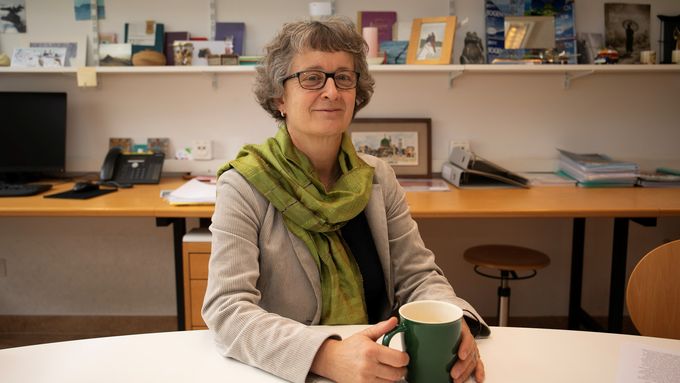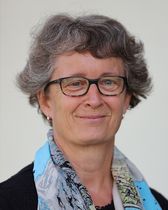We Simply Cannot Miss out on 50% of the Talent Worldwide
11.02.2020
On the International Day of Women and Girls in Science, Nicole Probst-Hensch, Head of the Department Epidemiology and Public Health at Swiss TPH, talks about her vision for more women in scientific careers.

Nicole Probst-Hensch is currently the only female member of the Swiss TPH Managing Board. (Photo: Danielle Powell, Swiss TPH)
Professor Probst-Hensch, why is it important that we celebrate the International Day of Women and Girls in Science?
The world is facing challenges that require scientific answers: just think about climate change. Greta Thunberg, a young woman with courage and dedication, motivated millions to work towards decreasing CO2 emissions. We now need talented scientists to help find solutions to decrease emissions. In order to trigger change, solutions will not only have to be technical but also social – such as changing people’s behaviour – and economic – such as estimating the long-term economic burden of global warming to inform policy-makers. With these challenges ahead, we simply cannot miss out on 50% of the talent worldwide, we need all hands on deck. In order to convince girls and women to follow a scientific career we also need to provide role models – this is why it is important to celebrate today.
Can you tell us more about your career?
I studied pharmaceutical sciences at ETH in Zurich. Given my strong interest in scientific writing and journalism, I joined the communications department at Roche for a couple of years. I then became very interested in environmental epidemiology and joined the Institute of Social and Preventive Medicine at the University of Basel with Prof. Ursula Ackermann-Liebrich for my doctoral studies. She was a great mentor and strong promoter of women in science. After then I obtained a Master of Public Health and a PhD in Epidemiology from UCLA in Los Angeles and was appointed a research professorship at the University of Southern California. This was an extremely stimulating academic environment; we all worked together irrespective of hierarchy. After we had our two children, my husband and I decided to move back to Switzerland to be closer to our families. I became the first director of the National Institute of Cancer Epidemiology and Registration at the University of Zurich. In 2010, I joined Swiss TPH and still love the unique way that knowledge and skills are combined here. The dedication and passion of our scientific and non-scientific staff towards improving health and well-being of people is both stimulating and rewarding.
Were there any differences to a typical male career? Did you face specific obstacles?
Leadership positions in the field of life sciences, as well as in other fields, are still male dominated – this is true for many countries, including Switzerland but also low- and middle-income countries. In my opinion, it has not helped women in Switzerland that for a long time, they could afford to stay at home given the high economic status of the country. So yes, I had to overcome obstacles. Those of my social network, sometimes those of my male colleagues at work, and often also my own. But one can overcome these obstacles. If there were no hurdles, we would not grow as human beings and as professionals.
What career advice do you give your younger female colleagues or PhD students?
Follow your interests and scientific passions and aim for excellency in what you do. Build a strong network including both women and men. Find mentors and partners that support and promote your career. Believe in yourself. Stand up for your rights. Do not be afraid of conflicts, but rather learn to handle them professionally. And as Sheryl Sandberg said, “don’t leave before you leave” — meaning do not doubt your ability to combine work and family and thus exclude yourself from projects before you even have a family.
You are currently the only female member on the Swiss TPH Managing Board. What differentiates your leadership approach from the one of your male colleagues?
Gender is only one attribute that differentiates the members of the Swiss TPH Managing Board. There are many others. We each have our own personalities, our own personal and professional histories, our own fields of research and approaches. These complementary attributes make us a strong team. We will have another woman join the team later this year, and I am very much looking forward to this increase in gender balance. I believe having at least two people from each gender in any management board is crucial.
What is your vision for women in science?
I hope that we do not need separate visions for women anymore. I very much hope that both men and women can follow their passions and talents and be supported. As mentors and supervisors, we must listen and observe very closely, communicate transparently and honestly, and provide the career support according to wishes, needs and talents. Personally, I am working on empowering women to have the confidence to apply for and take on any role or project they set their mind to. The only limit is the one you set for yourself.
Contact

Nicole Probst-Hensch
Professor, PhD (Pharmacy and Epidemiology), MPH
Head of Department, Group Leader, Head of Unit
+41612848378
nicole.probst@swisstph.ch
Stay connected
Subscribe to our newsletter and get all the latest research news, project updates, course and event listings from Swiss TPH.